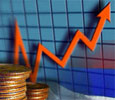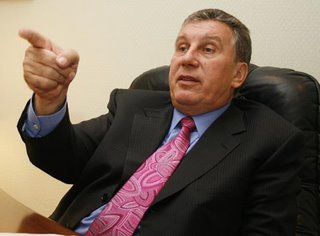This week's 'Bez Tsenzury' carries a
lengthy article about the growing struggle [and possible political and economic ramifications] between the major Donbas financial industrial groups [FIGs]. They are fighting over the supply of raw materials for their heavy industry plants. As usual I've loosly translated most of the significant portions:
Battle for the metalIncreasing opposition between oligarch- metallurgists threatens Ukraine with economic crisisThe Ukrainian State Property Fund [SPF] recently postponed for an indeterminate period the tender competition for the sale of 38,14% of the state-owned block of shares in the "Komsomol mine management" company . This was decided by a special VR commission on questions of privatization, which also ruled against additional conditions being applied in the competition.
Potential bidders accuse the head of the SPF, Socialist Valentina Semenyuk, of favouring the "Mariupol Metallurgical Combine im. Il'icha", [MMK] which is led by leading Socialist Vladimir Boyko.
The head of the VR special investigation commission on questions of privatization, VR BYuT-faction deputy Andriy Kozhemyakin, has referred the matter to the Prosecutor General, the Minister of Internal Affairs, and the security service.
Parliamentarians are concerned that the conditions currently being applied considerably narrow the circle of those who can participate in the competition for the purchase of the block of the shares of enterprise, and consider they are biassed in favour the "Mariupol Metallurgical combine im. Il'icha".
Kozhemyakin claims that that if the privatization tendering process for "Komsomol mine management" were to be fair, then the state would receive three times more money than is being offered by MMK, as most of Ukraine's FIGs would be interested in bidding and purchasing the shares.
"Komsomol mine management" is the sole producer of essential flux limestone for Ukraine's metallurgical enterprises. If the 'Il'ichevtsi' were to regain, via the SPF, the right to purchase the 38% of shares of "Komsomol mine management", practically the entire enterprise would be in their hands, since they already have possession of 60% of the shares, obtained by means of doubtful manipulations. The "Komsomol'sk-Il'ichevsk" conglomerate would become monopolist domestic producers of scarce flux limestone.
According to experts, the chances of opponents 'MMK im. Il'ich' purchasing the 38% of shares on offer will only increase if the leadership of SPF is changed, therefore they do not exclude the possibility of a political war between 'Regionaly' and their ruling coalition partners, the Socialists.
Experts do not doubt the fact that the MMK boss, "people's capitalist" and leading Socialist Vladimir Boyko, would not fail to exploit his position and take vengeance upon his competitors for all the years of humiliations and offences.
Recently the representatives of 'MMK im. Il'icha' accused "Avdeyevskiy KoksoKhimZavod", [coke works] which belongs Rinat Akhmetov, of the intentional disruption of deliveries of coke. Coke reaches other customers on time, but not to us, say the Il'ichevtsy. They have been forced to obtain alternative supplies from the far-off Altai region in Siberia.
'MMK im. Il'ich' has also had problems with iron ore supplies and has had to pay 'through the nose' for their raw material.
At a recent conference of the government commission for mining/metallurgy complex, the deputy minister of 'prompolitiki' Pavel Shinkarenko, in premier Victor Yanukovich's presence, warned that the problems being experienced by the industry right now are worse than have been for ten years or more.
"Metallurgprom" boss Vasiliy Kharakhulakh stated that during September production of cast iron fell sharply - by 134,000 tons, because of the undersupply of coke to 'MMK im. Il'icha' and "Zaporozhstal', and because of an emergency situation at the 'Yenakievsko Metzavod' . Deliveries of home-produced coking coal to the 'koksokhimzavods' have decreased by 180,000 tons.
The association of coke-chemical enterprises "UkrKoks " claims there could be a possible shortage 104,000 tons of coke for metallurgical enterprises during November. Moreover, the Ukrainian KabMin has decided to order 200,000 tons of coal, including coking coal, for supply of power stations, to ensure the country is prepared for winter. There are problems with the import of coal from Russia because of ever-increasing demand from the Chinese. There is also a shortage of suitable railroad wagons for transportation.
The problem is so acute that it seems that in 2007 it will be necessary to import more than 10 millions tons of coking coal - an unrealistically high quantity.
Experts assert that the present metallurgical crisis is the result of the privatisation campaign of "UkrRudProm", started by Yanukovich government as early as 2004.
Then, Ukrainian oligarchs, with the support to President Leonid Kuchma, forced through a law in parliament: "On the characteristics of the privatization of enterprises in the state joint-stock company UkrRudProm ". All the most tasty morsels of the metallurgical pie were divided up between the Financial Industrial Groups's owned by Igor Kolomoyskiy, Vadim Novinskiy, Victor Pinchuk and Rinat Akhmetov.
First of all, they determined ownership of the ore-dressing and iron-ore combines, to ensure that raw material supplies to their own industrial enterprises of were guaranteed.
Their competitors were left with the crumbs. The 'MMK im. Il'icha' was deprived of deliveries of domestic raw material, and interrelations between metallurgists and miners became almost war-like.
Simple workers have also been drawn into oligarchic disputes. [something I have posted blogs about recently] Workers have not only become instruments in the hands of their masters, but also the victims of their business warfare and intrigues. At the beginning of October approximately 150 representatives of the Joint stock company "DonetskKoks" picketed the Donetsk city executive committee. It seems that their enterprise is simply no longer required by its owner - Akhmetov's SCM corporation, which includes more profitable 'koksokhim' works, including the 'Avdeyevskiy KoksoKhim', the largest in Europe.
No one has considered the problems of other metallurgical producers and the universal shortage of coke. Protesters holding meetings are carring banners with the inscriptions "Koksokhim workers are not animals!", "Work for the people - coke for the country", and "Oligarchs - hands off the plant!"
Recently the minister of internal affairs Yuriy Lutsenko declared that in 8 months of the present year the state lost 8 billion hryven as a result of the irregularities in the metallurgical industry, that criminal investigations are proceeding into these matters, and that all material has been transferred to the state prosecutor who will make decision on how to proceed. The Minister emphasized that there was no political sub-text to his investigations, and enterprises were being checked independently of the political preferences of their management.
[Note: Lutsenko was suspended a few days ago from his ministerial position by the VR.
Socialist deputies abstained, and did not vote with their PoR coalition allies. The motion to suspend Lutsenko was carried only with the help of 'renegade' BYuT and NU deputies; some of these BYuT deputies are wealthy and influential associates of Yuliya T suggesting to observers that there may have been
collusion between PoR and BYuT on this VR motion.]
If one considers that the fraction of metallurgy in the export balance of our country exceeds 40%, then the losses to Ukraine may even be greater than the more significant numbers quoted by Lutsenko.
 The host for this event was, of course, President Alexander Lukashenko of Belarus with his exemplary comb-over hair cut - the give-away is the proximity of the parting-line to the ear, and the depth to which it extends around the back of the head. [see photo] I wonder if some kind of adhesive or fixative is used in its elaborate arrangement, in order to avoid possible embarrassment caused by unexpected gusts of wind etc.
The host for this event was, of course, President Alexander Lukashenko of Belarus with his exemplary comb-over hair cut - the give-away is the proximity of the parting-line to the ear, and the depth to which it extends around the back of the head. [see photo] I wonder if some kind of adhesive or fixative is used in its elaborate arrangement, in order to avoid possible embarrassment caused by unexpected gusts of wind etc.



